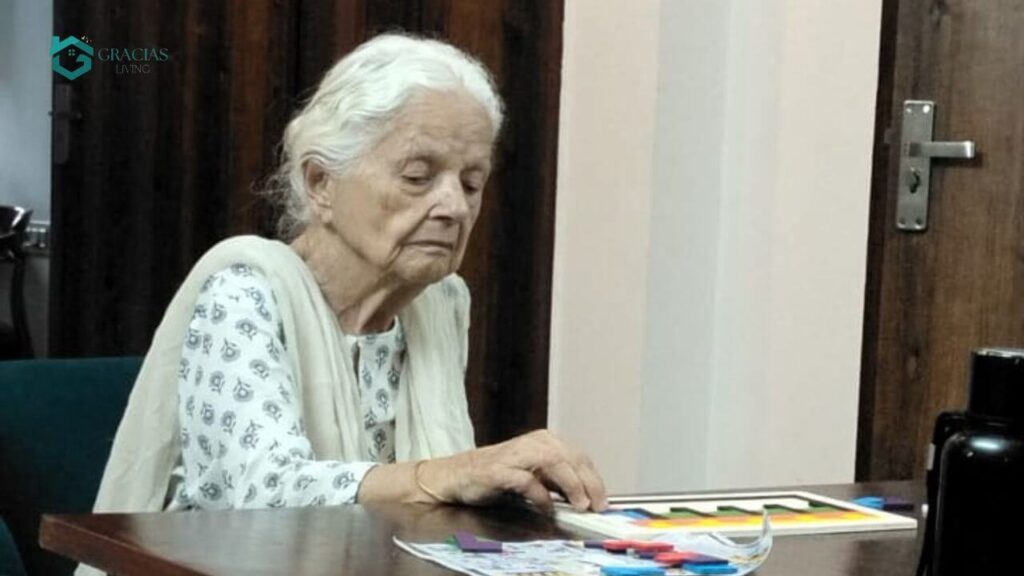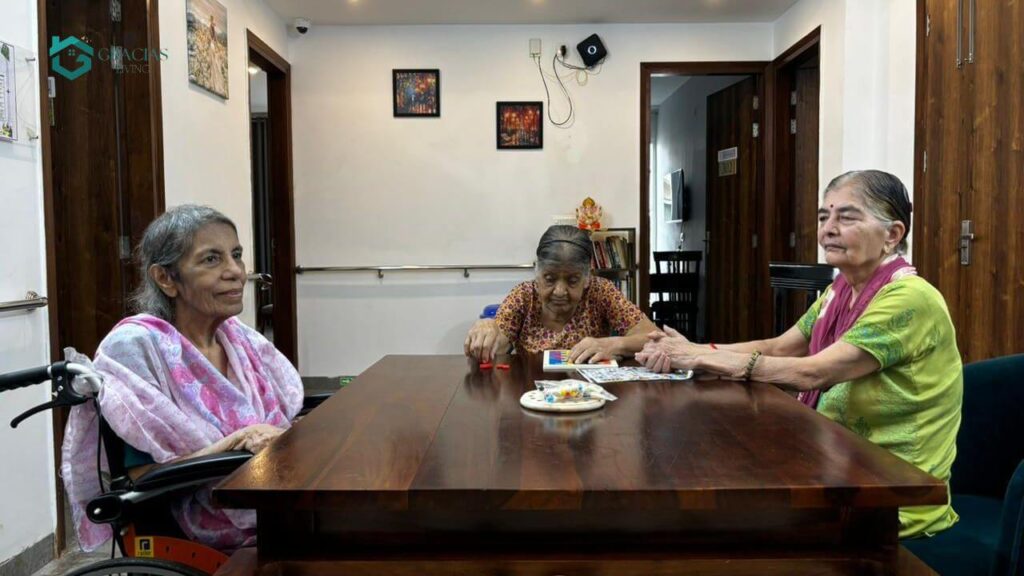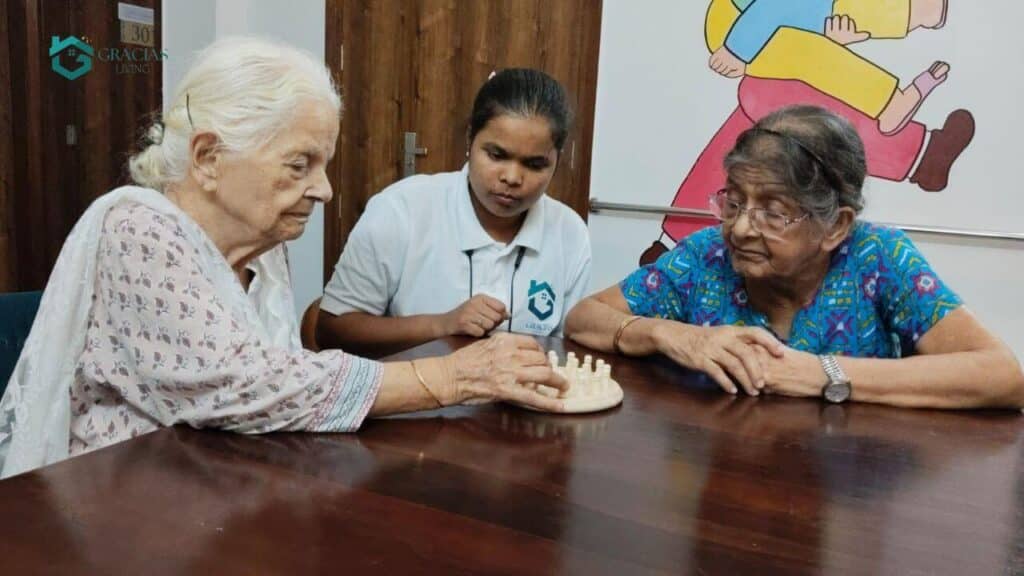Quick Summary of the article:
- Frontotemporal Dementia (FTD) involves degeneration of the brain’s frontal and temporal lobes, affecting behavior, personality, and language.
- FTD causes significant changes in an individual’s personality and communication abilities.
- Creating a safe, supportive environment with personalized care plans is crucial for managing FTD.
- FTD is challenging to diagnose and manage due to its unique symptoms and progression.
- Early recognition of FTD symptoms helps improve management and enhances quality of life.
Cause: Frontotemporal dementia (FTD) is caused by the progressive degeneration of the frontal and temporal lobes of the brain. These lobes are vital for various cognitive functions, including behavior, personality, and language. The degeneration is often due to the buildup of abnormal proteins, such as tau or TDP-43, which disrupt the normal functioning of brain cells.
Frontotemporal dementia is a less well-known but significant form of dementia affecting a growing number of individuals in India.
Detailed statistics on FTD prevalence in India are scarce.
FTD is often underdiagnosed due to low awareness among the general public and even some healthcare professionals, leading to a lack of accurate prevalence data.
Recognizing the early signs of Frontotemporal Dementia (FTD) is crucial for timely intervention.
An early diagnosis of dementia enables individuals and families to access appropriate support, plan for the future, and manage symptoms more effectively.

Frontotemporal Dementia: Prevalence and Awareness
| Aspect | Details |
| General Prevalence | Approximately 4.1 million people in India are affected by dementia, including FTD. |
| Specific FTD Prevalence | Exact prevalence data for FTD is scarce and likely underreported. |
| Awareness Levels | This is increasing due to efforts by NGOs, healthcare institutions, and awareness campaigns. |
| Educational Programs | Initiatives to educate healthcare professionals and the public about FTD are gaining traction. |
Frontotemporal Dementia’s Effects on the Brain
1. Frontal and Temporal Lobe Damage:
- Frontal Lobes: The frontal lobes are responsible for executive functions, which include decision-making, planning, emotional regulation, and social behavior. They help us control our impulses and behave appropriately in social situations.
- Temporal Lobes: The temporal lobes play a key role in language processing and memory. They are essential for understanding and producing language and recognizing familiar faces and objects.
2. Behavioral Changes:
- Personality Alterations: One of the most striking effects of Frontotemporal Dementia is the significant personality change. Individuals may become uncharacteristically disinhibited, showing aggressive behaviors that are socially inappropriate or out of character. For example, they might make inappropriate comments or behave rudely without realizing it.
- Impulsivity: There may be a noticeable loss of inhibition, leading to impulsive actions. This could manifest as inappropriate jokes, sudden decisions without considering consequences, or risky behaviors.
- Apathy: Apathy, or a lack of interest in activities and social interactions, is common. Individuals might seem emotionally flat and disengaged from things they used to enjoy.
- Social Behavior Issues: Those with Frontotemporal Dementia may struggle with empathy and understanding social norms. They might exhibit repetitive behaviors, such as clapping or repeating certain phrases, and may not adhere to social rules, making interactions with others challenging.
3. Language Difficulties:
- Aphasia: Frontotemporal Dementia can lead to aphasia, a language disorder that affects speech and comprehension. This can manifest as difficulty finding the right words, constructing sentences, or understanding spoken and written language.
- Non-Fluent Progressive Aphasia: Individuals with frontotemporal Dementia may speak in short, grammatically incorrect sentences and have trouble articulating their thoughts. Speech can become effortful and halting.
- Semantic Variant: Another subtype involves difficulty with word meaning, where individuals may not recognize or understand the meaning of words. This can lead to challenges in comprehension and communication. For example, they might struggle to name common objects or understand what others are saying.

Diet plan for a person with Frontotemporal Dementia
Creating a diet plan for a person with Frontotemporal Dementia involves focusing on balanced nutrition, ease of eating, and maintaining overall health.
1. General Principles:
- Balanced Diet: Ensure the diet includes a variety of fruits, vegetables, whole grains, lean proteins, and healthy fats.
- Hydration: Encourage regular fluid intake to prevent dehydration.
- Ease of Eating: Prepare foods that are easy to chew and swallow, and consider finger foods if the person has difficulty using utensils.
- Regular Meals: Serve meals at regular times to establish a routine and reduce confusion.
2. Foods to Include:
- Fruits and Vegetables: Fresh, frozen, or canned (without added sugar or salt) to provide essential vitamins and minerals.
- Whole Grains: Oats, quinoa, brown rice, and whole grain bread for fiber and sustained energy.
- Lean Proteins: Chicken, fish, eggs, beans, and legumes to support muscle health.
- Healthy Fats: Avocados, nuts, seeds, and olive oil for brain health.
- Dairy or Alternatives: Milk, yogurt, and cheese or dairy alternatives like almond or soy milk for calcium and vitamin D.

3. Foods to Avoid:
- High-Sugar Foods: Limit sugary snacks and beverages.
- High-Sodium Foods: Reduce intake of salty foods to manage blood pressure.
- Processed Foods: Avoid highly processed foods with artificial additives and preservatives.
- Hard or Crunchy Foods: If there are swallowing difficulties, avoid hard-to-chew foods that pose a choking risk.
Sample Diet for Frontotemporal Dementia
| Meal | Food Items |
| Breakfast | Whole grain oatmeal with berries and nuts, scrambled eggs, smoothie with yogurt and spinach. |
| Mid-Morning Snack | Greek yogurt with honey and almonds, soft fruit (banana, peach, melon slices). |
| Lunch | Grilled chicken salad with mixed greens and avocado, whole grain bread with hummus. |
| Afternoon Snack | Cheese and whole grain crackers, vegetable sticks with hummus. |
| Dinner | Steamed vegetables, quinoa or brown rice, mixed bean salad. |
| Evening Snack | Fruit and nut mix, herbal tea (chamomile or peppermint). |
Additional Supplements:
- Multivitamin: Consider a multivitamin supplement to ensure all nutrient needs are met, especially if the person has a limited diet.
- Omega-3 Fatty Acids: Found in fish oil supplements, they may support brain health.
Consult with a dietitian or healthcare provider to tailor the diet plan to the individual’s specific needs and preferences, ensuring all nutritional requirements are met.
Precautions to ensure the safety of Individuals having Frontotemporal Dementia
Caring for a person with Frontotemporal Dementia involves taking various precautions to ensure their safety, well-being, and comfort.
Ensure the living environment is free from tripping hazards, such as loose rugs and clutter. Use grab bars in bathrooms, handrails on stairs, and non-slip mats in areas prone to getting wet.
Implementing these precautions can help manage the symptoms of FTD, ensure the safety and well-being of the person with dementia, and support caregivers in providing the best possible care.
Here are some essential precautions to consider:
1. Safety Precautions
| Aspect | Details |
|---|---|
| Home Environment | Remove tripping hazards, secure dangerous items, and install safety devices. |
| Wandering Prevention | Secure exits, ensure the person carries identification, and provide supervision. |
| Driving | Regularly assess driving ability, and arrange alternative transportation if necessary. |
2. Health and Behavioral Management
| Aspect | Details |
| Regular Check-ups | Routine visits to healthcare providers keep vaccinations up to date. |
| Medication Management | Ensure adherence, use pill organizers, and regularly review medications with a healthcare provider. |
| Nutrition and Hydration | Provide a balanced diet, and encourage regular fluid intake. |
| Behavioral Strategies | Use positive reinforcement, maintain a calm environment, and create a structured routine. |
Memory games for frontotemporal dementia patients
Memory games for frontotemporal dementia patients can be highly beneficial in stimulating cognitive functions and providing mental engagement.
Suitable games include matching cards to enhance memory recall and attention, word searches to improve focus and pattern recognition, and simple picture puzzles to boost problem-solving skills and visual memory.
Trivia questions stimulate general knowledge and recall, while sequence sorting promotes logical thinking. Using daily routine cards helps reinforce structure and routine tasks, and “Name That Tune” engages auditory memory.

Photo flashcards encourage personal memory recall and conversation, sorting games enhance categorization skills, and storytelling prompts boost creativity and verbal expression.
The table below provides a few memory games that are of cognitive benefits to frontotemporal dementia patients.
| Game | Description | Benefit |
| Matching Cards | Match pairs of cards with identical images | Enhances memory recall and attention |
| Word Search | Find and circle hidden words in a grid of letters | Improves focus and pattern recognition |
| Picture Puzzles | Assemble jigsaw puzzles with simple, large pieces | Boosts problem-solving skills and visual memory |
| Trivia Questions | Answer simple trivia questions about familiar topics | Stimulates general knowledge and recall |
| Sequence Sorting | Arrange cards or objects in a specific order (e.g., events, numbers) | Promotes logical thinking and sequencing skills |
| Daily Routine Cards | Match cards depicting daily activities to their correct time slots | Reinforces daily structure and memory of routine tasks |
| Name That Tune | Listen to short clips of familiar songs and identify them | Engages auditory memory and recognition |
| Photo Flashcards | Show photos of family members or familiar places and discuss them | Encourages personal memory recall and conversation |
| Sorting Games | Sort objects or cards by category, color, or size | Enhances categorization and sorting skills |
| Storytelling Prompts | Use prompts to create and share short stories or memories | Boosts creativity and verbal expression |
Conclusion
Gracias Living is dedicated to providing exceptional care and support for all our residents, including those with frontotemporal dementia.
We create a safe, engaging, and nurturing environment. Our caregivers offer a variety of activities like memory games, art sessions, and social events to keep minds active and spirits high.
We focus on personalized care plans to ensure that the physical, emotional, and mental well-being of residents is taken care of. At Gracias Living, we believe in building the Senior community, making it a true home where residents feel valued, supported, and connected, and maintaining their dignity and respect.
Our compassionate approach ensures that our Seniors receive the best possible care, enhancing their happiness and quality of life.





